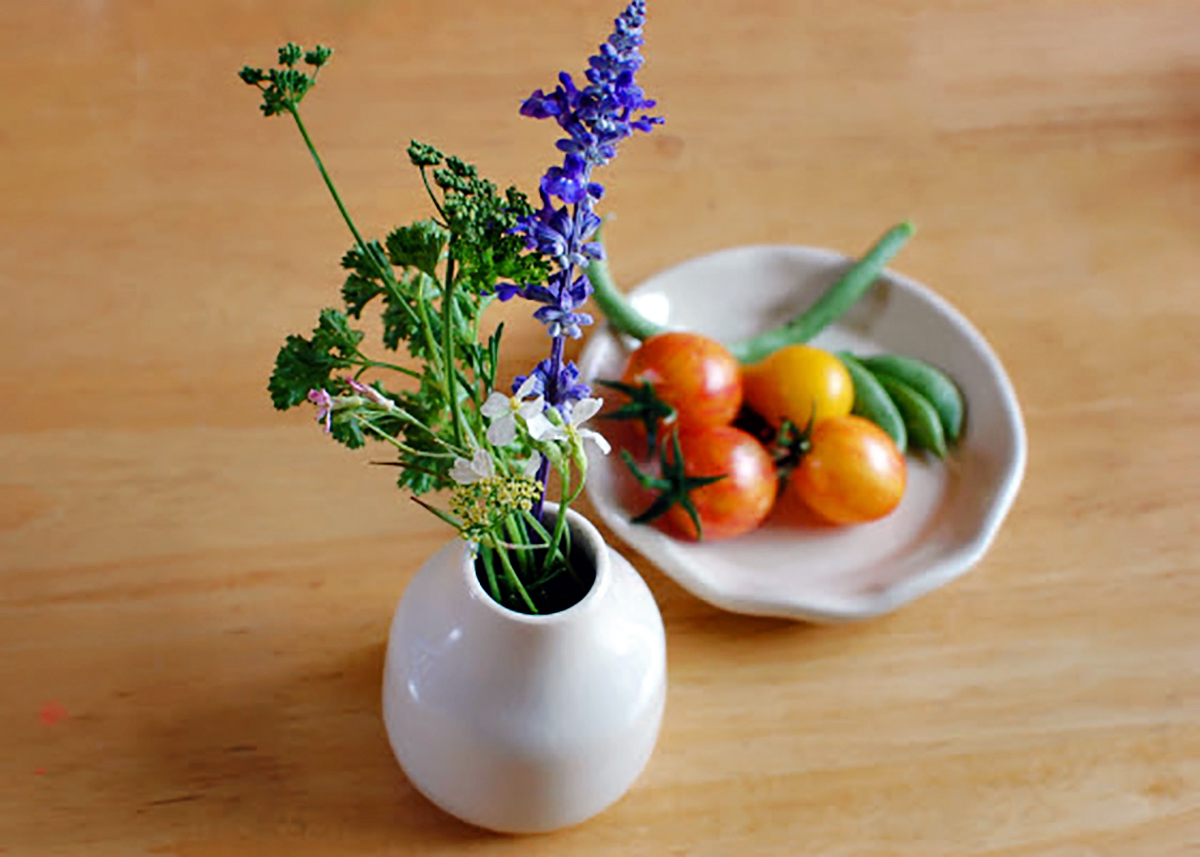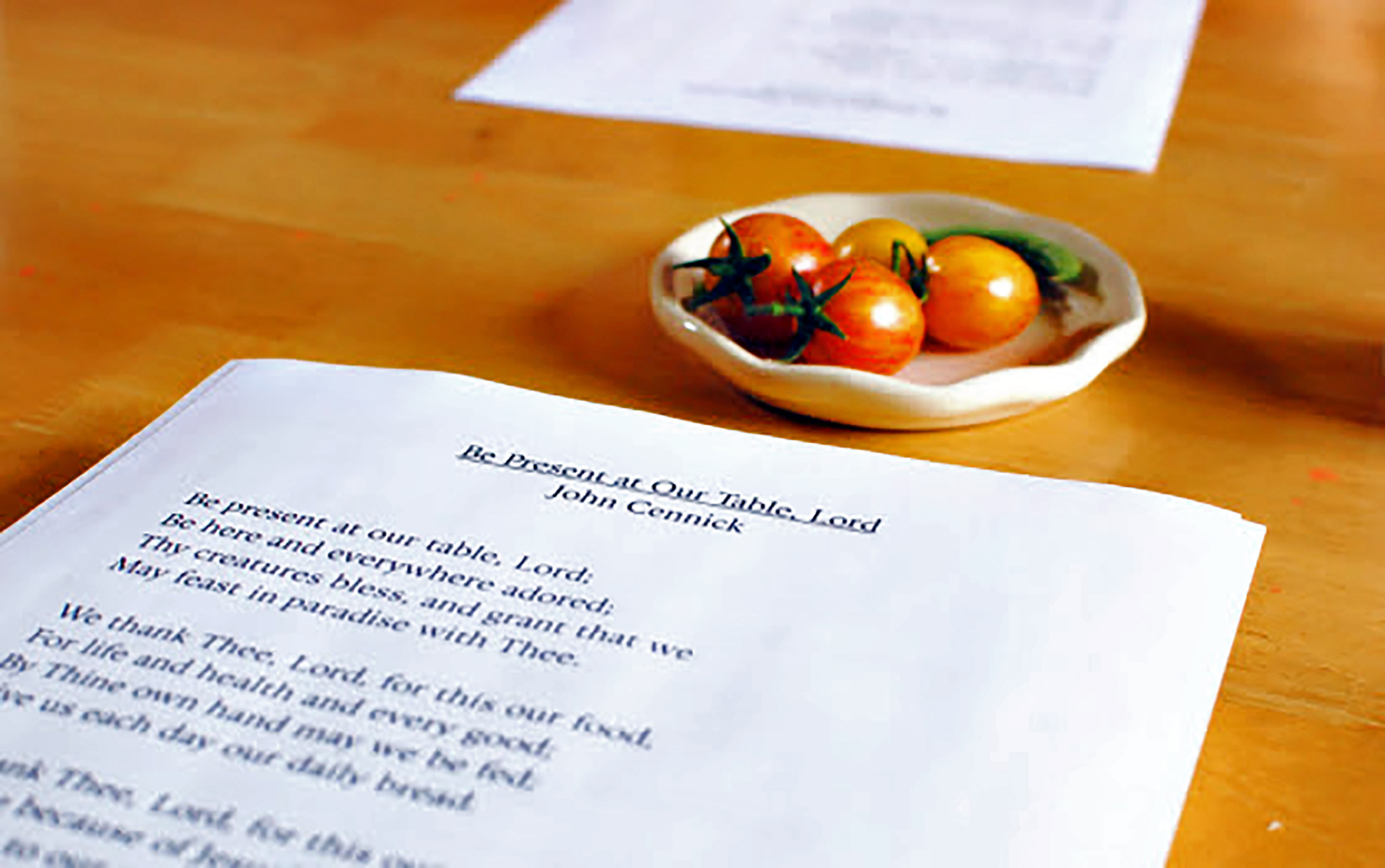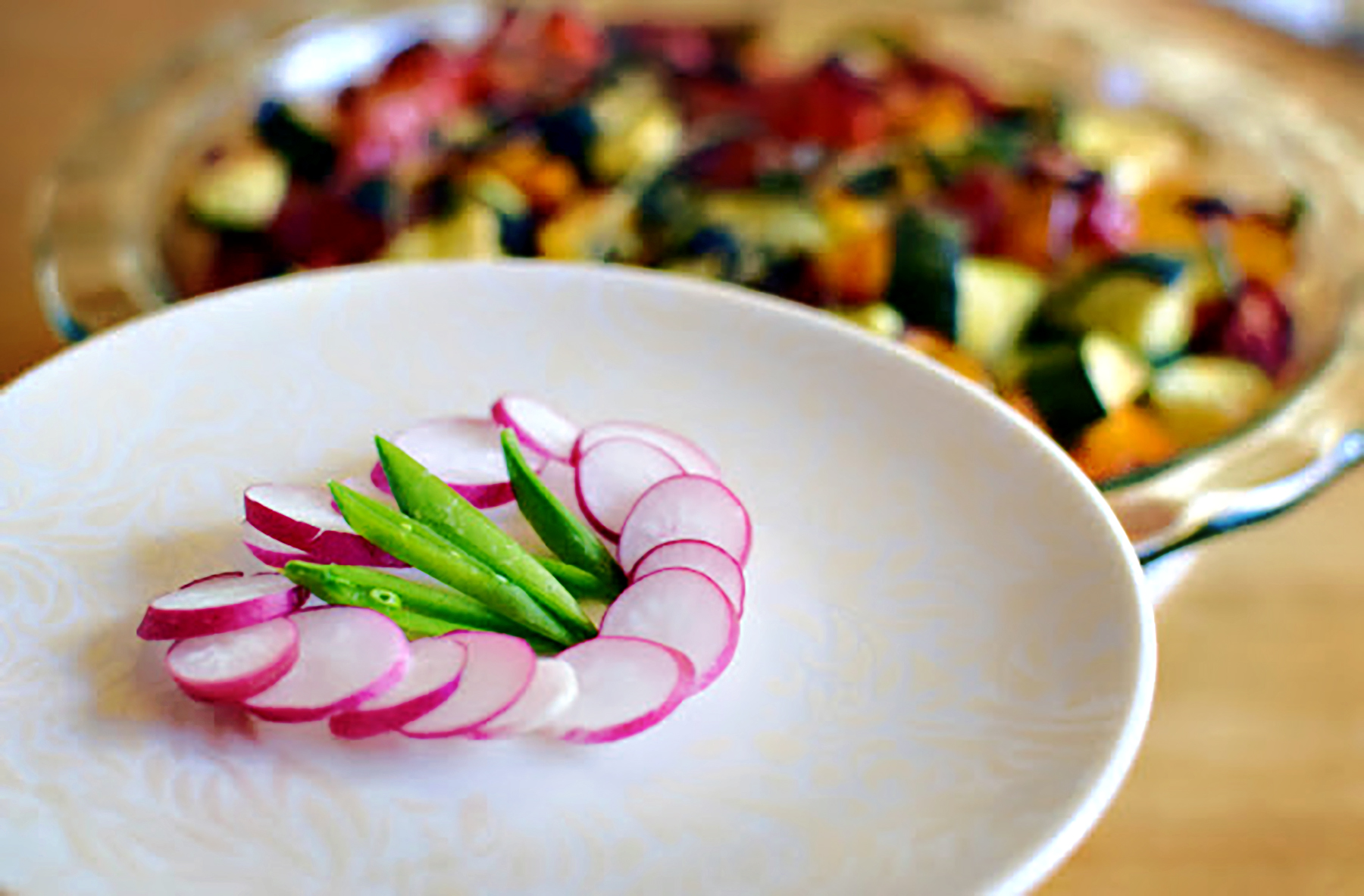Last year, I jotted down a memory:
On the fifteenth of July I greeted Y in the morning with the words, “It’s Firstfruits Day!” — blithely uttered, as if it were some familiar and elaborate tradition of this house, rather than a spontaneous idea that I’d run by him earlier that week.
For days the girls and I had been eyeing the small vegetables in the garden that might make a passable first harvest. A garden, like a sunset, is never the same from one manifestation to the next; we’ve introduced new plants each year, and each year have faced new (often six-legged) challenges. This summer’s edition surprised us with moss curled parsley and blue salvia that returned all on their own in the spring. I laughed to see the three cosmos plants I had carefully raised growing neatly inside the eastern flower box, and the veritable forest of their volunteer cousins thriving just outside of it.
All told, the long-awaited Little Feast of Firstfruits was sweetly unassuming: we gathered whatever had come into its first blush of ripeness, clustered around the table, gave thanks, and talked a little about receiving the firstfruits of the Spirit and offering God our best out of trust.
We sang John Cennick’s hymn “Be Present at Our Table, Lord,” which I first learned of ages ago from the beautiful Dear Audrey blog (now aptly named Studies in Hope). Then we carefully divided up the fruit into four portions, and tasted the sun-ripened hope of abundance to come. Something about having eked food out of the ground — our ground; our sandy, clay-bound dirt — adds an extra tang of sweetness and gratitude each year.
This tradition is one worth keeping, I think.
One sugar snap pea, four French Breakfast radishes.
Yesterday the girls took up the impromptu first harvest of a garden stunted by a cold spring. I’ve felt relieved — and sorry — to read that our garden is one of many across our town whose seedlings are still only a tentative few inches from the ground. Flea beetles and hailstones have riddled the baby alyssum plants so full of holes that many have withered away; here and there, stripped green bean stems keep the forlorn vigil of empty signposts, their foliage tucked away in the bellies of baby grasshoppers.
Nevertheless, when the girls came running into the house with the radishes swinging from their joyous fists like small crimson bells, I remembered last year’s little feast.
In the kitchen, I sliced and slivered our firstfruits into a few red-rimmed white wafers and lacy green straws, and set them in a tea saucer.
Such a small offering, swimming in white space.
But our littlest held the saucer as if it held the prized bounty of Autumn’s peak harvest, watching over it carefully while Y read from Deuteronomy.
“And you shall rejoice in all the good that the LORD your God has given to you and to your house…”
I listened while he prayed for a good yield from the ground, as if we were farmers and not town-dwellers, that we might have something to share with others.
I listened, and then I heard one thing more from a different Voice:
“Do you not yet understand?“
The garden will most likely revive. I know enough to expect this by now, and I walk daily among the sprouts and tomato star-blooms that promise fruit will come at the right hour.
It’s not in the garden, lately, that I’ve felt the meagerness of my offerings. It’s in the ways that I think I ought to be taking care of my family, my home, my body; it’s in the words I’ve tapped out, only to be deleted letter by letter (and verily, in the stories that I can’t even bring myself to begin typing, for fear of missing the mark). Despite the parenting books and home education tomes and writing manuals on our shelves, I must regularly sit down to try and remember what I am supposed to be doing — and how.
I could say the same of chores, and friendships, and health, and writing: there seems precious little to show for so much labor (or, often, the pretense of it).
Like other members of my generation and culture, I’ve been trained to work towards optimal standards and ideal goals all my life. But the truth is that my intercessory prayer list, lab test results, and myriad stacks of essay drafts and home education plans currently show a starker side to the life I wish to lead — the powerless portion, the part that ultimately cannot close the gap between aspiration and successful execution. If I want to pay attention to the details of my life and live in the present, this is one detail I can’t close my eyes to: sometimes, no matter how hard I try, greater efforts only lead to diminished gains.
But — “Do you not yet understand?“
The probing question rang well into the still hours of my evening — this question that Christ asked His disciples when they were out in their boat together with one loaf for the whole lot of them. Could they not remember what He had done with five loaves for five thousand? And the seven loaves for four thousand? In a concrete, coarse-crumbed illustration of Isaiah 58:6-12, He underscored not only His ability to bring abundance out of scarcity, but the disciples’ experience of finding themselves served in the process of serving others. John Piper notes:
The leftovers were for the servers. In fact, the first time there were twelve servers and twelve basketfuls left over (Mark 6:43) — one whole basket for each server. The second time there were seven basketfuls left over — seven, the number of abundant completeness.
What didn’t they understand? That Jesus would take care of them. You can’t out-give Jesus. When you spend your life for others, your needs will be met. “My God will supply every need of yours according to his riches in glory in Christ Jesus” (Philippians 4:19).
Always, the breaking and the pouring precede the receiving.
In short, what couldn’t He do with the offering of a single loaf?
Hours after the baby radishes and snap pea were passed around and eaten with thanksgiving, I finally understood something vital about the firstfruits offering, at least in this house.
We don’t make the offering to say that we are offering Him our wealth — even the best of it. We make the offering to rejoice in the good that He has given us, and to offer Him whatever good He will bring out of the ground in the season to come, that others may live. This includes the right to break sod wherever He wills: the ground of physical weakness, the clumsy first draft in an inglorious succession of revisions, the repeated surrender of self-set aims. My hand trembles to write of these things, but my heart is learning to bide its time for the shouts of joy in the reaping season.
Yesterday morning, with no inkling of the coming feast, I began the day with these glad words — and exhaled:
It is you who have given me the power to do one kind of work and have withheld the skill to do another. It is you who hold in your hand the threads of this day’s life and you alone who know what lies before me to do or to suffer. But because you are my Father, I am not afraid. Because it is your Spirit that stirs within my heart’s most secret room, I know that all is well. What I desire for myself I cannot achieve; but whatever you desire in me you can help me to achieve. The good that I want to do, I fail to do, but you can give me the power to do good.
Dear Father, take this day’s life into your keeping. Guide all my thoughts and feelings. Direct all my energies. Instruct my mind. Sustain my will. Take my hands and give me the skill to serve you. Take my feet and make them quick to do whatever you ask. Take my eyes and keep them fixed on your everlasting beauty. Take my mouth and give me the words to tell others of your love. Make this day a day of obedience, a day of spiritual joy and peace. Make this day’s work a little part of the work of the kingdom of my Lord Jesus, in whose name these prayers are said. Amen.
– John Baillie, A Diary of Private Prayer (rev. Susanna Wright), Ninth Day Morning.
To Him, then, whose goodness I have “prov’d o’er and o’er,” be all: the day, the season, the yield.
We may never have more than a handful for our first harvests here. But for the offering that it is — a single loaf relinquished, a young radish raised in trust and split with thanksgiving — and what it shall be in the hands of the Lord of the Harvest, I understand now it is enough for the feast.
Enough, even, for leftovers.
Little Feast of Firstfruits was first published on Amy Baik Lee’s beautiful website – SunSteeped Days, and the lovely images used here are with her kind permission. If you are not yet familiar with Amy’s work, do go to her website and enjoy the feast there!
Amy Baik Lee is a contributing writer for Cultivating Magazine and the Rabbit Room, a literary member of the Anselm Society Arts Guild, and the author of This Homeward Ache. A lifelong appreciator of stories, she holds an MA in English literature from the University of Virginia and still “does voices” when she reads aloud. She writes at a desk that looks out on a small cottage garden in Colorado, usually surrounded by her husband’s woodworking projects, her two daughters’ creative works, and patient cups of rooibos tea.
Leave a Reply
A Field Guide to Cultivating ~ Essentials to Cultivating a Whole Life, Rooted in Christ, and Flourishing in Fellowship
Enjoy our gift to you as our Welcome to Cultivating! Discover the purpose of The Cultivating Project, and how you might find a "What, you too?" experience here with this fellowship of makers!




A beautiful and timely reminder to me of god’s assured and constant provision – thank you!
Pauline, I’m so glad this played a part in reminding you of His goodness. Thank you for letting me know!
This was such a beautiful reminder that we don’t make our offerings to give him our wealth, and that He does not require or demand our perfection, but that even our meager offerings, given in love and thankfulness, are accepted by Him with love and can become so much more than we can imagine. I needed this today.
Amy, I first read in Welcoming Rest, The Cultivating Project. I was initially drawn in by having also lived in Charlottesville and knowing the beauty of the area, and by my gardening experiences. Oh, the jiy of those meager first fruits!!
Thank you for the reminder that we give freely as an offering, as an act of confidence that He is able to meet all our needs according in His riches. We have truly witnessed this in miraculous ways. Joyfully offering today.
Oh, the joy of those meager first fruits!!
Thank you for the reminder that we give freely as an offering, as an act of confidence that He is able to meet all our needs according in His riches. We have truly witnessed this in miraculous ways. Joyfully offering today and welcoming rest in the very act.